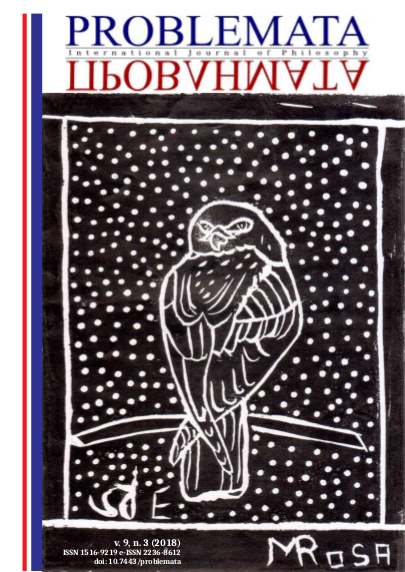REFERENCES ON A NIETZSCHIAN METHODOLOGY FOR SCHOOL
DOI:
https://doi.org/10.7443/problemata.v9i3.41654Keywords:
Nietzsche. Methodology. High school. Philosophical practice.Abstract
This article aims to present research in development on methodological proposal of philosophy teaching for the high school. For this, the main reference is Friedrich Nietzsche's educational thinking, specifically two Nietzschean philosophical movements: "becoming what one is," which corresponds to a necessary genealogy of oneself in the process of philosophical education, and what is linked to the theme of the beyond-man (über-mensch), towards self-improvement, to the affirmation of a creative singularity of self as philosophical experience par excellence. In this way, we try to discuss how these two movements can be constituted in practices of teaching of philosophy and how they can be apprehended as notes to think the best methodological strategies for the teaching of philosophy. It is, therefore, to understand the inherent dynamics of philosophical learning as a starting point for the establishment of more effective ways of teaching philosophy to high school students.
Downloads
References
DIAS, Rosa Maria. Nietzsche, vida como obra de arte. Organização Evandro Nascimento. Rio de Janeiro-RJ: Civilização Brasileira, 2011.
FOUCAULT, Michel. Dits et Écrits I – 1954-1969. Paris: Gallimard, 1994.
LARROSA, Jorge. Como se chega ao que se é. Para além da Bildung. In: LARROSA, Jorge (Org.). Nietzsche e a Educação. 3. ed. Tradução Semíramis Gorini da Veiga. Belo Horizonte: Autêntica, 2009, p. 41-67.
LARROSA, Jorge. Ler em direção ao desconhecido. Para além da Hermenêutica. In: LARROSA, Jorge (Org.). Nietzsche e a educação. 3. ed. Tradução Semíramis Gorini da Veiga. Belo Horizonte: Autêntica, 2009, p. 13-40.
NIETZSCHE. Friedrich W. Genealogia da moral: uma polêmica. Tradução e notas de Paulo César de Souza. São Paulo: Companhia das Letras, 1998.
______. A gaia ciência. Tradução Paulo César de Souza. São Paulo: Companhia das Letras, 2001.
______. Ecce homo. Madrid: Alianza, 1971.
______. III Consideração intempestiva: Schopenhauer Educador. In: MELO SOBRINHO, Noéli Correia de (Org.). Escritos sobre educação: Friedrich Nietzsche. São Paulo: Loyola, 2003a. p. 138-222.
______. Sobre o Futuro dos nossos estabelecimentos de ensino. In: MELO SOBRINHO, Noéli Correia de (Org.). Escritos sobre educação: Friedrich Nietzsche. São Paulo: Loyola, 2003b. p. 41-137.
ZUBEN, Marcos de Camargo Von; MEDEIROS, Rodolfo Rodrigues. Nietzsche e a educação: autonomia, cultura e transformação. Trilhas filosóficas. Revista da Faculdade de Filosofia da UERN, Caicó-RN, ano VI, n. 1, p. 71-93, jan.-jun. 2013.
Downloads
Published
Issue
Section
License
Authors who publish with this journal agree to the following terms:
- Authors retain copyright and grant the journal right of first publication with the work simultaneously licensed under a Creative Commons Attribution License that allows others to share the work with an acknowledgement of the work's authorship and initial publication in this journal.
- Authors are able to enter into separate, additional contractual arrangements for the non-exclusive distribution of the journal's published version of the work (e.g., post it to an institutional repository or publish it in a book), with an acknowledgement of its initial publication in this journal.
-
- Authors are permitted and encouraged to post their work online (e.g., in institutional repositories or on their website) prior to and during the submission process, as it can lead to productive exchanges, as well as earlier and greater citation of published work (See The Effect of Open Access).





